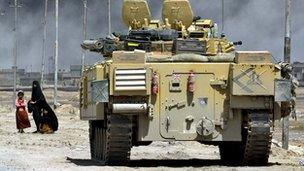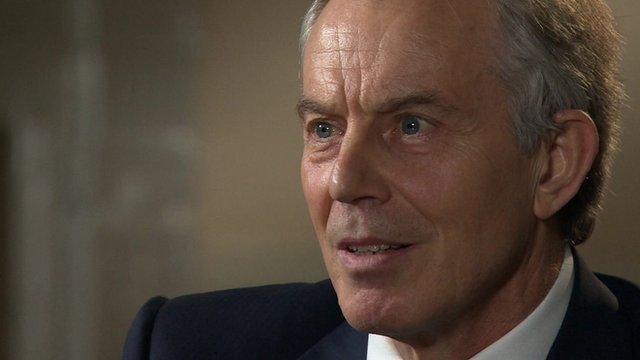John Prescott: Iraq invasion 'cannot be justified'
- Published
- comments
Lord Prescott: Iraq war cannot be justified as an intervention
The invasion of Iraq in 2003 "cannot be justified", Lord Prescott - who was then deputy prime minister - has said.
He told BBC One's This Week he had backed the Iraq War because he believed George Bush had a plan to resolve the Israeli-Palestinian conflict.
He said he could not "just disown it" but he now thought the war was wrong.
Meanwhile, Foreign Secretary William Hague has written to cabinet members urging them not to discuss the justification for the Iraq war.
The invasion of Iraq led by US troops, in coalition with the UK and other nations, began on 20 March 2003.
Lord Prescott said that, ahead of the invasion, Prime Minister Tony Blair had been keen "to get the Americans in" on the UN's approach to dealing with Iraq.

The US-led invasion of Iraq began in the early hours of 20 March 2003
He said that, after Mr Blair had sent him to the US to talk to Vice-President Dick Cheney, he told the PM it was clear "They're going to go in without you; whether you come with them or not, it doesn't matter to the Americans - they're getting ready".
Lord Prescott added: "But I tell you something that persuaded me. You know Bush was quite prepared to have a plan for Israel and the whole problem in regard to Palestine and he promised.
"And, therefore, that plan was something."
But Lord Prescott said the plan "fell apart as it often does in American politics because the influence domestically is too great".
He said that, despite these factors, "at the end of the day, Tony Blair obviously said to himself, 'I've promised to do this and I'm going to do it' - and that's today's consequences".
Lord Prescott added: "And I have to be part in that - I can't just disown it. I go through my thoughts trying to justify it, but that's... it cannot be justified as an intervention."
Lord Prescott's comments go further than those made in a 2009 Guardian newspaper interview when he talked about misgivings he had about the war.
They come in contrast to comments made by Mr Blair in an interview for Newsnight's Iraq: 10 Years On special, shown on BBC Two on Tuesday.
Asked about the decision to invade, Mr Blair said: "If we hadn't removed Saddam from power just think, for example, what would be happening if these Arab revolutions were continuing now and Saddam, who's probably 20 times as bad as Assad in Syria, was trying to suppress an uprising in Iraq?
"Think of the consequences of leaving that regime in power.
"So when you say 'do you think of the loss of life since 2003?' of course I do. You would have to be inhumane not to, but think of what would have happened if he had been left there."
'Beyond doubt'
Mr Blair says he has given up trying to persuade people that invading Iraq was the right choice
In 2010, at the Chilcot Inquiry into the Iraq War, Mr Blair - quizzed about the controversial claim in a September 2002 dossier that Iraq could deploy weapons of mass destruction at 45 minutes' notice - said it "assumed a vastly greater significance" afterwards than it did at the time.
He has insisted that, on the basis of the intelligence available at the time, it was "beyond doubt" Iraq was continuing to develop its weapons capability.
The UK lost 179 servicemen and women, of which 136 were killed in action, before the last British troops were withdrawn in April 2009.
Conservative estimates put the number of Iraqis killed in the invasion and ensuing sectarian violence at about 100,000.
Meanwhile, sources close to Foreign Secretary Mr Hague have confirmed that he has written to cabinet ministers reminding them of government policy not to comment on the justification or otherwise for the Iraq war until after the Chilcot Inquiry reports.
The Guardian reports that the letter has angered Lib Dem ministers whose party has always considered it an illegal war started by Mr Blair.
One Whitehall source said what Mr Hague had done "is write to cabinet ministers reminding them of government policy that we should not prejudice the Chilcot Inquiry."
Sir John Chilcot has said the report into his inquiry, which featured 18 months of public hearings between 2009 and early 2011, will not be published before the middle of this year at the earliest.
In his last update, in July 2012, Sir John said the inquiry had made "extensive progress" in drafting its report - expected to be about a million words long - but that the inquiry was "unprecedented" in scope and the issues were "complex".
- Published26 February 2013
